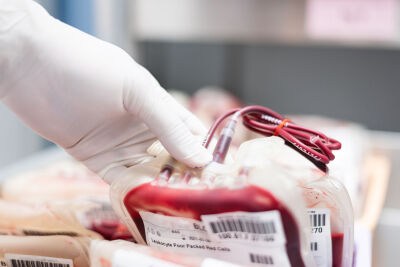METRO DETROIT — When Roland Meeker was born prematurely at 24 weeks at St. Joseph Mercy Ann Arbor Hospital, his tiny body experienced many complications, including the inability to produce red blood cells.
The micro preemie infant, who was transferred to C.S. Mott Children’s Hospital in Ann Arbor, received several blood transfusions as he spent nearly four months at the medical center with his parents, Aimee and Ray Meeker, taking turns to be by his side.
“It’s absolutely amazing what they can do,” Aimee said of the medical staff. “It’s pretty incredible to see how they were able to keep him alive.”
What also helped the newborn grow stronger were the blood transfusions he received while in the hospital those first few months of his life. When it was time for him to come home, it was “scary.”
“It’s exciting but also just a whole whirlwind of trying to navigate a child that’s not the typical newborn,” Aimee said.
Next month, Roland will turn 3. The family, which includes the Meekers’ 4-year-old son, Lorenzo, will celebrate the young boy who loves to play with his big brother, watch “Paw Patrol” and collect Hot Wheels cars.
“He’s doing really great,” Aimee said. “The doctors are constantly surprised. He’s relatively healthy and gaining in his milestones.”
January is National Blood Donor Month, which serves to raise awareness of the need for blood donations. On Jan. 8, the American Red Cross issued a press release stating the nonprofit organization is experiencing an emergency blood shortage with the nation facing the lowest number of people giving blood in 20 years.
“The Red Cross blood supply has fallen to critically low levels across the country, and blood and platelet donors are urged to make an appointment to donate to help alleviate the shortage and help ensure life-saving medical procedures are not put on hold,” the press release stated.
The donated blood is used in a variety of ways, including for accident and burn victims, and for trauma, heart surgery, organ transplant and cancer patients. Patients with chronic diseases also receive blood when needed.
The press release states the number of people donating blood to the Red Cross has declined by about 40% in the past two decades. According to Red Cross officials, blood products are going to hospitals faster than blood donations are coming in.
As a result, the Red Cross must limit distributions of type O blood products — among the most transfused blood types — to hospitals due to supply restrictions. Donors of all types, especially those with type O blood and those giving platelets, are urged to give. Platelets are needed for cancer and trauma patients and must be transfused within five days of donation.
“Small changes in blood donor turnout can have a huge impact on the availability of blood products and dramatic consequences for those in need of an emergency blood transfusion,” Barry Siegfried, M.D., medical director of the Red Cross Michigan Region, said in a prepared statement. “More challenges may lie ahead as the potential for severe winter weather and seasonal illnesses like the flu may compound the dire blood supply situation.”
There are eligibility requirements to donate blood. Donors must be at least 16 years old in most states, must be in good health and feeling well, and must weigh at least 110 pounds. Blood can be donated every 56 days.
After all the Meekers experienced with Roland’s premature birth, Aimee has become a regular blood donor. She donated blood twice in 2023 and plans to continue giving in the years ahead.
“It doesn’t seem that important to give blood, but when you need it, it’s life changing,” she said. “It’s one of those things you don’t think about until it affects your life.”
She “was pretty surprised” when she learned that other relatives and people she has known had to receive blood transfusions at one time or another.
The American Red Cross is providing an incentive in an effort to garner blood donations. Donors who give blood in January will be entered to win a trip for two to the Super Bowl on Feb. 11 in Las Vegas. That includes a three-night hotel stay, roundtrip airfare, $1,000 gift card for expenses, and other pregame activities. For more details, visit RedCrossBlood.org/SuperBowl.
There are three ways potential donors can make an appointment: by using the Red Cross Blood Donor app on their smartphone, visiting the Red Cross website at RedCrossBlood.org, or calling the Red Cross at (800) RED CROSS, which is (800) 733-2767.
 Publication select ▼
Publication select ▼





























